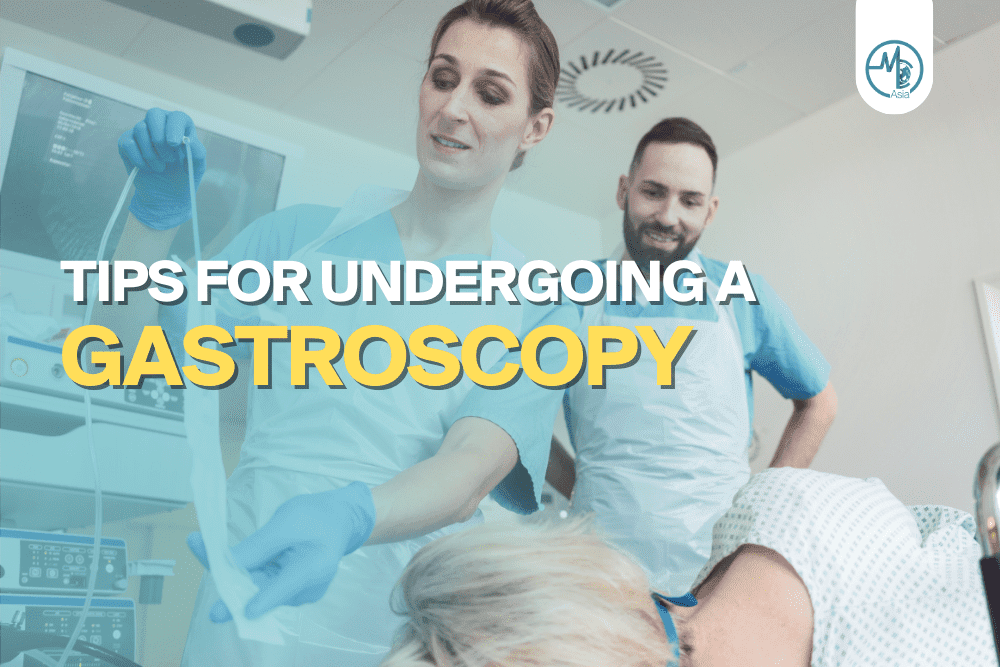If you’re scheduled for a gastroscopy, it’s natural to have questions and feel a bit anxious. This procedure, though common, can seem daunting.
However, understanding what to expect can help ease your concerns. Here’s a comprehensive guide to help you prepare for your upcoming gastroscopy with the advice of Dr Peter Goh, Consultant in Bariatric Surgery at Advance Surgical Group.
Understanding Gastroscopy
Gastroscopy, also known as an upper GI endoscopy, is a diagnostic procedure used to examine the upper part of the gastrointestinal (GI) tract – including the oesophagus, stomach, and duodenum (the first part of the small intestine). It’s typically recommended to investigate symptoms like persistent stomach pain, nausea, vomiting, or difficulty swallowing. It can also detect conditions such as ulcers, gastrointestinal bleeding, and tumours.
Dr Goh shared that gastroscopy is a life-saving procedure that can diagnose serious diseases and can intervene before the disease gets to an incurable state. He also added that “polyps detected can be removed through the gastroscope by using a snare.”
The Procedure
A gastroscopy involves the use of a gastroscope – a thin, flexible tube with a light and camera at the end. You’ll be asked to lie on your side, and a sedative may be administered to help you relax. The gastroscope is then gently inserted through your mouth and down your throat to examine your upper GI tract. The procedure usually takes about 15 to 30 minutes.
Preparation is Key
- Fasting: You’ll need to fast for about 6 to 8 hours before the procedure to ensure an empty stomach. This is crucial for a clear view and to prevent any complications.
- Medication Adjustments: Inform your doctor about all the medications you take, as some may need to be adjusted or stopped temporarily.
- Arrange Transportation: Since you’ll likely be sedated, plan to have someone drive you home after the procedure.
During the Procedure
- Sedation: Most patients receive a sedative to minimise discomfort and anxiety. While you may be awake, you’ll be in a relaxed state.
- Throat Spray: A local anaesthetic may be sprayed on your throat to numb it, which helps ease the insertion of the gastroscope.
- Insertion of the Gastroscope: The procedure is not painful, but you may feel some pressure or mild discomfort.
After the Procedure
- Recovery: You’ll spend about an hour in the recovery area as the sedative wears off.
- Mild Side Effects: It’s normal to experience mild sore throat, bloating, or gas after the procedure.
- Results: Your doctor will discuss preliminary findings with you on the same day. If a biopsy was taken, those results might take a few days.
Risks and Complications
Gastroscopy is a safe procedure, but like any medical intervention, it carries some risks. These include bleeding, especially if a biopsy is taken, and rare instances of perforation (a tear) in the GI tract lining.
Dr Goh also added that “patients will feel absolutely nothing because the patient will be under heavy sedation.”
Tips for a Smooth Experience
- Stay Informed: Don’t hesitate to ask your doctor any questions you have about the procedure.
- Follow Pre-Procedure Instructions: Adhering to the fasting and medication guidelines is essential.
- Rest and Hydrate: After the procedure, take it easy for the rest of the day and drink plenty of fluids.
- Monitor for Complications: While rare, contact your doctor if you experience severe pain, fever, or vomiting after the procedure.
Importance of Gastroscopy
Dr Goh stressed the importance of getting a gastroscopy. He stated “It has saved many lives in the world because it can detect early gastric cancer, which can be removed through the scope and skip the need for major operations. Probably hundreds of thousands or even millions of gastroscopy procedures are done everyday.”
Conclusion
A gastroscopy is a valuable tool in diagnosing and sometimes treating upper GI tract issues. By understanding what the procedure involves and how to prepare for it, you can approach your gastroscopy with more confidence and ease. Remember, it’s a routine procedure that plays a crucial role in maintaining your digestive health

